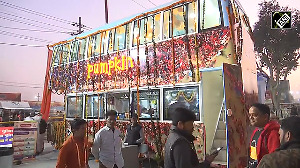It was certain that trade unions would oppose the government's first attempt to sell its majority stake.
The divestment of 74 per cent stake in Modern Food to Hindustan Lever expectedly raised a few hackles, but the government steadfastedly maintained that bread-making was not its business.
| |||||||||||
Sterlite Industries had a tougher time. After shelling out Rs 551.5 crore (Rs 5.51 billion) for picking up a 51 per cent stake in Balco, the workers greeted the new management with a 67-day strike, which resulted in a loss of Rs 200 crore (Rs 2 billion).
Two years since, Sterlite is still coping with labour problems from former employees who were handed post-dated cheques under the voluntary retirement scheme.
For all the problems Sterlite encountered in acquiring Balco, it had a cake walk while taking over Hindustan Zinc Ltd a year later in April 2002.
Among all the divested PSUs, HZL tops the list not only in terms of increased profitability, but also in terms of the number of workers opting for voluntary retirement.
Over 25 per cent of the company's work force, or 2,284 employees, availed of VRS. Wages have also increased 18-20 per cent under the new management.
There have also been allegations of retrenchment from erstwhile PSUs. These are being looked into by a fact-finding team comprising representatives of the government, trade unions and employers.
Notwithstanding the 67-day strike, Sterlite made an ex-gratia payment of Rs 5,000 to all workers in Balco.
While 1,099 employees opted for VRS offered in July 2001, there continues to be a hue and cry over the terms of the scheme, with employees losing out on interest for not being paid any lumpsum amount.
The existing work force has, however, seen an increase in allowances besides a guaranteed benefit of 20 per cent of the basic pay.
Hindustan Lever's VRS for Modern Food employees saw the company's staff reduce by half. The attractive VRS, providing for 65 days' emoluments for every year of service, against the government's norm of 45 days' emoluments, was accepted by 974 employees.
Prior to divestment, the government paid an ex-gratia of Rs 160,000 per worker. This has shot up to Rs 310,000 under Hindustan Lever.
The average salary per worker has also gone up 29 per cent to Rs 8,000 per month from Rs 6,200 per month at the time of divestment.
The Tatas announced a productivity-linked incentive to the CMC staff for 2000-01 after taking over the company in October 2001 and continued with it in the subsequent years. Since privatisation, there has been a fresh recruitment of about 600 employees.
In Hindustan Teleprinters Ltd, 60 people have opted for VRS since Himachal Futuristic Communications Ltd took over. Some casual workers have also been laid off.
In Videsh Sanchar Nigam Ltd, only 100 employees opted for VRS offered in October, 2001. The company seeks to reduce its staff by 1,700, or 63 per cent of its total work force of 2,700.
A new round of golden handshake was introduced in May this year. The scheme was open to employees who were aged above 40 and had put in a minimum of 10 years of service.
In monetary terms, this entailed a payment of Rs 230,000-10.60 lakh (Rs 1 million) per employee. However, this scheme has also got the thumbs down from the staff.
Zuari-Maroc, which acquired Paradeep Phosphates, avoided a possible clash with the unions by signing an agreement with the workers.
It also revised wages with retrospective effect from 1997. As a result, salaries and wages have gone up 30 per cent.
In IPCL, which is second to HZL in terms of increase in profit margins, as many as 1,563 employees have opted for VRS offered under the new management, Reliance.
But after 150 dismissals, Reliance is still groping with complaints of delay in long-term settlements with the local union and of unfair implementation of the shareholders' agreement.






 © 2025
© 2025